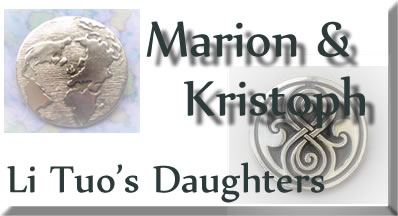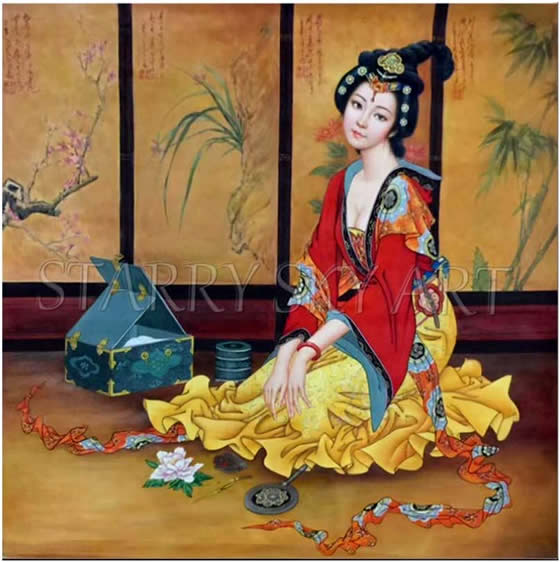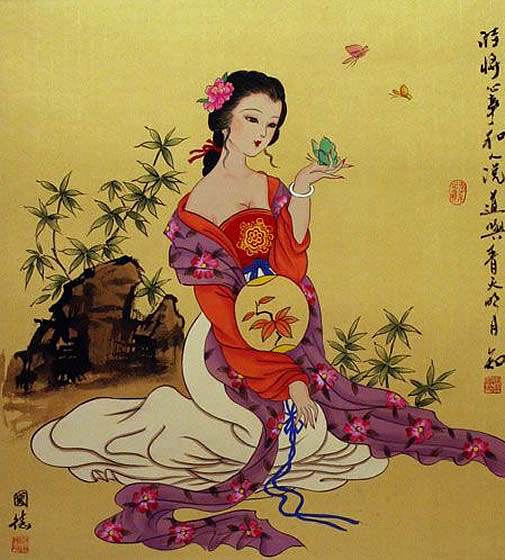

Marion was spending the evening in Liverpool with Lily. Kristoph had promised to come and take his ladies home in the TARDIS later, but for now they were both happy to spend a quiet evening in the beautiful living room above the Chinese herbalist shop whose proprietor, Mai Li Tuo, was only a Chinaman in his spirit. His blood, was the light orange of a Time Lord of Gallifrey.
Li always sought to hear all the news from Gallifrey when they visited. Of course, Marion and Lily only really had the social news. He would wait for Kristoph to arrive to catch up on the political developments. But he seemed to enjoy hearing the latest gossip from the women of the Conservatory. It was all part of the world he loved and was so far from here in his exile on Earth.
“Li, doesn’t it make you sad hearing all these things?” Marion asked him. “Surely it is too cruel to listen to us talk like this when you can never go back…”
“Gallifrey lives in my hearts, My dear,” he answered. “My exile is only in body, not in soul. In truth, the exile that pained me most was when I left China for the first time in nearly two thousand years. The Japanese invaders had hurt the country enough. But the Communists tore the heart out of her. All that I loved about that beautiful, enigmatic country was destroyed or debased.”
Marion understood. He had spoken bitterly about the Communist takeover of China many times. To Marion it had been something that was touched on briefly in her history A-level course. For him it was an old wound that ached in his hearts.
“But at least you can go back to the China you loved,” she told him. “Your TARDIS will take you there.”
“That is true,” he admitted. “Though sometimes, knowing what will come of the place in a matter of generations does sadden me. I feel as if I want to cry out to my people, begging them not to let the change come upon them.”
“Some of the changes were for the better,” Lily pointed out. “There were some terrible practices in Li’s China. Abandoning unwanted babies to die…”
Li smiled softly and took Lily’s hand in his. He lifted it to his lips and kissed it gently.
“Lily, my dear, you know I always did everything in my power to stop that terrible practice. And many other customs that would seem shocking to your way of thinking. But even so it was a noble life, a good life. And my first exile weighed less heavily on me than it might when I lived in that magnificent land.”
“That’s because you had so many compensations,” Lily teased him. Her eyes turned upon a large album that sat in pride of place on the dresser. Li smiled warmly and asked Marion to fetch it for him.
Both women knew what the album contained, of course. They had seen it many times. Li had shown it to them whenever the conversation leaned that way on a quiet evening like this.
“Funny to think of you having a photo album thousands of years before photography was invented,” Marion said as she opened the first page and carefully folded back the tissue that protected the finely drawn ink portrait of a woman with an oval face and almond shaped eyes who smiled demurely for the artist who depicted her. She and Lily knew that was Li’s first Chinese wife, a woman of the mountain village where he settled who came to him in her youth and remained by his side until she died of old age.
The earlier pictures were of a simple style, line drawings with only one or two colours, and they had faded a little with time. Later ones were more sophisticated. The portraits of high born ladies and even princesses who he had loved tended to be very elaborate. Lily and Marion both admired one very lovely and detailed painting of a lady sitting in a boat on a lake. There were trees overhanging the lake, all reflected in the water, and a small pagoda roof in the distance. But the most distinctive feature was the lady’s face as she looked towards the shore.
“She is in love with the artist,” Lily said. “You can see by the way her eyes are fixed upon him.”
“No,” Li answered. “She is in love with the man who commissioned the artist, and who is sitting beside him as he works.” He smiled and it was obvious that it was he who was sitting watching the lady and the artist. “Her name was An Lang Ang. She was the daughter of the local mandarin. I was a retired warrior chief who was honoured and respected in the province for bringing peace through the battles I fought. I had a house almost as grand as the mandarin’s own palace, servants to do my bidding. That lake was a part of my property. It served no other function except to be beautiful and to enchant Lady Ang. I used to tease her that she married me for my lake, not for my own worth, but she laughed at that notion and told me the lake was nothing without me.”
“Quite right, too,” Lily told him. “You were very much in love with her?”
“I have been very much in love with all of my wives,” Li answered with a warm smile at Lily who was, after all, his present wife, he having married her by Chinese custom. “Lady Ang was a jewel, even so. Though she made me a poorer man in gold and jewels, she made me richer by far in another way.”
“How?” Marion asked. Lily smiled. She obviously knew this story already. She pressed her hand over Li’s and their eyes met. Whether anything telepathic passed between them, she wasn’t sure. But certainly there was a look in their eyes that spoke a thousand words.
Li ran his finger along the inside edge of the page where the picture of the lady in the boat was fixed, and Marion noticed that it was doubled over. Li opened it out to reveal another set of pictures that were hidden inside the fold.
It was the same scene, but there were two boats. Lady Ang sat in one, and Li sat in the other. There were two children in each boat with them. Four beautiful little girls in silk dresses that matched Lady Ang’s. One was about twelve years old, nearly a woman by the standards of China in that time. Another was eight or so, with an angelic smile. The next down was no more than six, and the littlest one was Rodan’s age, looking like a little doll with a bamboo parasol shading her face in emulation of the older girls and the Lady herself.
“But… Li…” Marion protested. “They can’t be your own children. You said that you cannot…”
“They’re not,” he admitted. “Nor are they Lady Ang’s daughter’s by birth. She found them, all four of them in their turn.”
“Found?”
“They were all of them abandoned by their parents,” Li said. “Lily mentioned already the widespread and dreadful practice of exposing unwanted girl children to die. You see, in rural China there were often times of famine. For poor people in rural China there was always the dilemma of feeding unproductive members of the family. Boys could work in the fields and earn their keep. They could go to be soldiers. Girls… of course they could marry. They could work in the houses of the wealthy landowners. But where many sons were seen as an asset, many daughters were a burden. An unwanted girl baby would be left in the fields or by the roadside in the burning sun or a deluge of rain until it was a burden no longer.”
“That’s horrible,” Marion said. Lily agreed. So did Li.
“It is, and I urged Lady Ang’s father to condemn the practice. Which he did. But the problem of feeding many mouths in a time of scarcity remained.”
He paused and delicately touched the face of the eldest child.
“Lun Lun, we called her. Lady Ang found her beside a rice field where men and women were working to bring in the harvest. None of them would admit to being the parent of the child even though she threatened to bring her father’s wrath down upon them. So she brought the child home. At first I put up a strong argument against adopting the discarded child of a peasant. I can’t quite recall what the argument was, now. It was a good one, or at least I thought it was. My Lady’s one was better. Lun Lun, by the way, means ‘discourse’. It seemed appropriate. And, yes, I came to be glad that I lost the argument. She was a delightful child. She grew up with all the accomplishments of an Imperial Lady, just like her adopted mother. I loved her dearly and regretted only that she would one day leave us. As, of course, she did, only two years after that painting was done. She was fourteen, and a jewel in my house. When an official from the Imperial court came to Lady Ang’s father’s house on a visit his eye fell upon her. He approached me with his suit, and though I was sad for myself and my Lady, I knew it would be a fine marriage. The official was a strong, handsome young man, and Lun Lun was as enamoured by him as he was of her. I allowed the betrothal on condition that they were married in our province before he returned to the Imperial Court with her as his bride.”
“Oh, Li,” Marion sympathised. “How sad for you, to part with her, and at such a young age.”
“It was the right age for that time and place,” Li insisted. “And she was happy. Of course, the Imperial Palace was many weeks journey away, by caravan. But at least once a year we received a letter from her, telling how happy she was living in the Imperial Palace itself. And we were delighted when, in course of time, we learnt that she, herself was a mother, even though we never saw her son. We never saw our jewel again with our own eyes. That was how it was, of course.”
“And you had three other jewels in your life, of course,” Lily reminded him.
“Oh, indeed,” Li added. “The next youngest was Tian Hui. She was a clever girl, a born scholar. And that was not such a difficult thing for a girl as you might think. Not one who’s father had money to spend on her education, anyway. She had the best tutors and learnt all there was to be learnt. So did my little Jin Jing. She was an artist. They both made my Lady and I proud. Tian Hui married a scholar. They lived a quiet life, pursuing their love of learning every day. Jin Jing never married. She joined her sister at the Imperial Palace where she became the official artist.” Mai Li Tuo smiled a secret smile. “In the detestable communist China, they have museums and galleries that display the art and culture of the Imperialist past, to which tourists from the west flock. And in their collections are beautifully preserved silk paintings which my dear Jin Jing made for the Emperor six hundred years ago. Her name is forgotten. But her artistic legacy remains, even despite modern efforts to obliterate the past.”
Li sounded so very proud. And well he might. Then his eye fell on the image of littlest child. The one who looked like a doll.
“Xian Su. She was her father’s daughter,” he said. “I know… none of my DNA was in her, of course. But nobody would have known it. From an early age she joined me in my dojo and learnt the skills and disciplines of Wushu Gung-Fu. It was clear that she was destined to be a Master. But that meant another sad parting and at an even earlier age. My dear Lady Ang accepted it, but sadly. She loved all of our adopted daughters and another one going far from us for ever was a wrench. But when Xian Su was eight years old she came with me on a journey. It was nearly two hundred miles from our home to Henang Province and the mountain of Songshan where the great Shaolin temple stood. It took many months of travel. And then I stayed a year there myself, renewing my own skills while she began as a child novice. By the time I set off home again, she had learnt discipline enough not to shed a single tear. I was proud to tell her mother that. She, my Lady Ang, cried, of course. But with pride, as well as sorrow. Our youngest child did us great honour by her dedication to the Shaolin Way.”
If he was anything but a pure blood Gallifreyan, Marion thought Li Tuo might have shed a tear or two himself. There was a look in his eyes.
“They all lived good lives. The two who married blessed us with grandchildren. Before my Lady Ang died of old age, quietly in her bed, they, too, had children of their own. I had a dynasty, even if it was not of my own blood. I had the joy of fatherhood. It was a blessed time in my long life.”
“Then why do you hide their pictures?” Marion asked as he folded the page back in place. It sealed itself along the binding and to the naked eye it was impossible to see that the hidden page was there.
“They are long dead,” Li said. “That is the curse of an exiled Time Lord. I have outlived all of my wives. That was to be expected. But by the time I had outlived all of my children it became that little harder to bear. They sleep in my memory. From time to time, I allow myself to think of them. But it is easier if I don’t do that too often.”
“Oh, Li,” Marion said, reaching to hold his hand. “Oh, I am so sorry.”
“Don’t be,” he told her. “After all, you are the hope for the future. Lily and I both look forward to the day when you bring forth the heir to the House of Lœngbærrow. He will be the new joy in all our lives.”
“That will be a while coming, yet,” Marion said.
“There is plenty of time,” Lily assured her. “But, yes, when that day comes, the House of Lœngbærrow will not be the only one that celebrates. You may be sure of that.”

 |
 |
 |